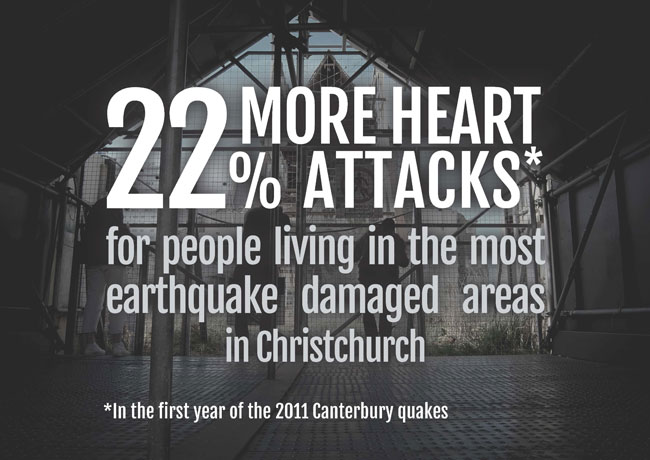
A Healthier Lives National Science Challenge study using New Zealand linked datasets reveals the impact of residential housing damage from the 2010/11 Canterbury earthquakes on hospital admissions for cardiovascular disease.
The research found that people living in areas with more severely damaged homes in the first year after a major earthquake had elevated levels of cardiovascular disease, and heart attacks in particular.
Key findings from this research are outlined in a paper published today in the international journal The Lancet Planetary Health.

Professor Vicky Cameron
“We were interested in the long-term impact of the earthquake given the prolonged insurance settlement process, particularly among those who were most impacted by earthquake damage to their homes,” says author Professor Vicky Cameron, cardiology researcher from Healthier Lives and the University of Otago, Christchurch.
Earthquake Commission residential building claims data in mesh-blocks of about 30 houses were linked to residential information at the time of the 4 September 2010 earthquake. The population of adults aged 45 years and older were then followed up to examine new cases of hospital admission with cardiovascular disease and cardiovascular deaths. Results were adjusted for the influence of age, sex, ethnicity, small area deprivation index and personal income.

Dr Andrea Teng
In the first year, people who were living in the most damaged areas in Christchurch had around 10 per cent more cardiovascular hospitalisations compared to the least damaged areas, 22 per cent more hospitalisations for heart attacks (myocardial infarction), and 25 per cent more deaths from cardiovascular disease. Over the first 12 months of the Canterbury earthquakes, in areas with the most damage to homes there was an excess of 66 (7-125) hospital admissions for cardiovascular disease, and 29 (0-53) admissions for heart attacks, compared to the least damaged areas. However, in the four subsequent years there was no evidence of an association of these outcomes with earthquake housing damage.
Cardiovascular disease rates are known to increase immediately after a severe earthquake. However less is known about the magnitude of this increase over a longer time frame, and whether this is associated with level of housing damage. This study demonstrates evidence that people living in areas with more severely damaged homes in the first year after a major earthquake had elevated levels of cardiovascular disease, and heart attacks in particular.

Professor Tony Blakely
The researchers suggest policy responses that could reduce impacts on cardiovascular events include pre-earthquake measures to minimise building damage, early wellbeing interventions within the first year to address post-earthquake stress, and enhanced provision of cardiac prevention and treatment services.
Professor Cameron said, “The cardiovascular impact of the Canterbury earthquakes is a reminder of the broader health impact of a natural disaster and the importance of considering cardiovascular prevention in natural disaster preparedness, resilience and recovery.”
“This paper is one of the first examples of an international publication demonstrating the value of Statistics New Zealand's Integrated Data Infrastructure and its linked administrative data for health research,” says study co-author Dr Andrea Teng, Senior Research Fellow at Healthier Lives and the University of Otago, Wellington.
This Healthier Lives National Science Challenge study was funded by the Ministry for Business, Innovation and Employment and carried out by a team of researchers at the University of Otago, Wellington, University of Otago, Christchurch, University of Canterbury and Opus.
For further information, please contact:
Professor Vicky Cameron
University of Otago, Christchurch
Telephone: 64 3 364 1210
Email: vicky.cameron@otago.ac.nz
Dr Andrea Teng
University of Otago, Wellington
Email: andrea.teng@otago.ac.nz

Read more about the Healthier Lives National Science Challenge
A list of Otago experts available for media comment is available elsewhere on this website.
Electronic addresses (including email accounts, instant messaging services, or telephone accounts) published on this page are for the sole purpose of contact with the individuals concerned, in their capacity as officers, employees or students of the University of Otago, or their respective organisation. Publication of any such electronic address is not to be taken as consent to receive unsolicited commercial electronic messages by the address holder.